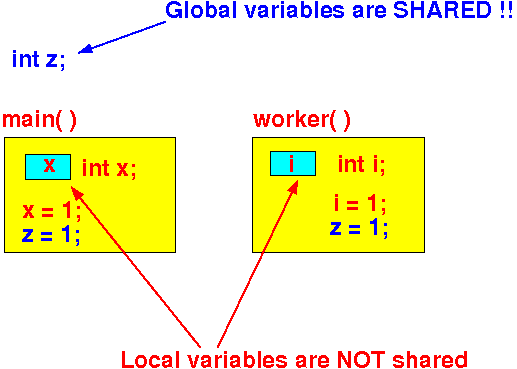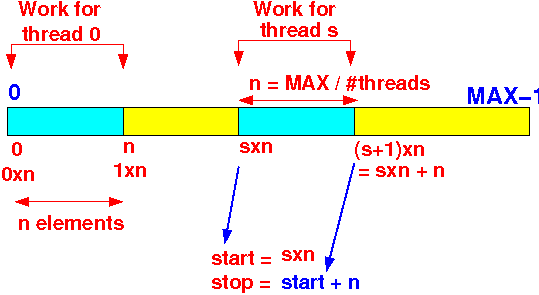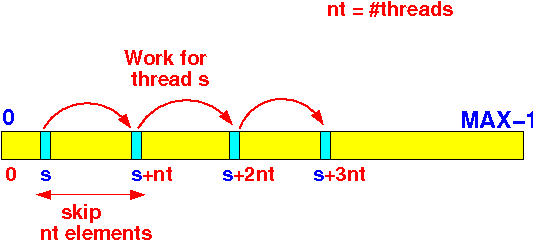- The follow program fragment depicts a common motif
of parallel programs:
void *worker (void *arg) { .... (You will need to convert arg to the correct type before you can use the value passed) .... } int main(int argc, char *argv[]) { // SEQUENTIAL Section .... Prepare problem (setup shared variables) .... // PARALLEL Section // Start the worker threads for (i = 0; i < NUM_PROCESSORS; i = i + 1) { param[i] = ....; pthread_create(&tid[i], &attr, worker, & param[i]) } // Wait for all workers to finish for (i = 0; i < NUM_PROCESSORS; i = i + 1) pthread_join(tid[i], NULL); // SEQUENTIAL Section .... Post process results from workers.... (Or start another prepare section followed by a parallel + join section) }Note:
- You can pass a parameter
of any type
to the worker() function
- But inside the worker() function, you will have to cast the value to the correct type
- You can pass a parameter
of any type
to the worker() function
- Fact:
- The main function often
need to
pass a
huge amount of data
to
the worker( ) functions
to be processed
- Example: sort an
array
The entire array need to be "passed" !!!
- Example: sort an
array
- The main function often
need to
pass a
huge amount of data
to
the worker( ) functions
to be processed
- Passing a large amount
of data between
the main( ) function and
the worker( ) function
(that is executed by
multiple threads)
are usualy done through:
- Shared (memory) variable(s) !!!
because:

You will see in the demo programs that the data that need to be processed are stored in a global variabel
You do this, so that:
- The main( ) function can
initialize the
variables (usually an
array)
- The worker( ) function can
access the
variables !!!
(Otherwise, the worker( ) function cannot work !!!)
- Note:
- The worker( ) function
sometimes will
produce some
output
- It is easier to
use global variables to
pass the
output value to
the main( ) function
- We will use global variables to pass the output from the worker( ) function to the main( ) function....
- The worker( ) function
sometimes will
produce some
output
- When writing a parallel program, you
must divide the work
into
(preferrably) non-overlapping subtasks
- Usually there are
many different ways
to divide a task into subtasks
(And sometimes, it is not possible to divide the task into non-overlapping tasks and you may have to repeat some steps - necessary evil in parallel programming...
- You may think that dividing the task of
"Finding the minimum value"
in an array is pretty straighforward - and yet, there are
many ways
to do so.
Some ways are better than others.
- Let's do a simple example: split the task of
"Finding the minimum value"
in an array into 2 subtasks (each subtask performed by one thread).
- Solution 1:
(2 threads)
- Split the array into 2 (approximate) equal halfs
- Thread 1 finds the minimum in the first half of the array
- Thread 2 finds the minimum in the second half of the array
- Main thread waits for the results and find the actual minimum.
Pictorially:
values handled by values handled by thread 0 thread 1 |<--------------------->|<--------------------->| | | | | V V min[0] min[1] \ / \ / \ / \ / \ / main thread | | V Actual minimumIn general, the division of the data in the array is as follows

Main Thread:
- Create the
worker( ) threads
(run the
function
worker( ))
- The main( ) function
passes an
id to each
worker( ) function thread
- 0 means: find minimum in array[0 .. n-1]
- 1 means: find minimum in array[n .. 2n-1]
- 2 means: find minimum in array[2n .. 3n-1]
- And so on
- Wait for the
worker( ) function to
find the
minimum in its
range
- thread 0 will return the minimum value in variable min[0]
- thread 1 will return the minimum value in variable min[1]
- thread 2 will return the minimum value in variable min[2]
- And so on
- Find the overall minimum among the minimum values min[0], min[1], min[2], ....
C++ code for the main( ) function:
/* Shared Variables */ double x[1000000]; // Must be SHARED (accessed by worker threads !!) int start[100]; // Contain starting array index of each thread double min[100]; // Contain the minimum found by each thread int num_threads; // ----------------------------------- // Create worker threads.... // ----------------------------------- for (i = 0; i < num_threads; i = i + 1) { start[i] = i; // Pass ID to thread in a private variable if ( pthread_create(&tid[i], NULL, worker, (void *)&start[i]) ) { cout << "Cannot create thread" << endl; exit(1); } } // ----------------------------------- // Wait for worker threads to end.... // ----------------------------------- for (i = 0; i < num_threads; i = i + 1) pthread_join(tid[i], NULL); // ---------------------------------------- // Post processing: Find actual minimum // ---------------------------------------- my_min = min[0]; for (i = 1; i < num_threads; i++) if ( min[i] < my_min ) my_min = min[i];
Worker Thread:
- Finds the minimum value in
its portion of the
array
- Recall how
the thread s determines
its portion of work:

The C++ code for worker( ):
void *worker(void *arg) { int i, s; int n, start, stop; double my_min; n = MAX/num_threads; // number of elements to handle s = * (int *) arg; // Convert arg to an integer start = s * n; // Starting index if ( s != (num_threads-1) ) { stop = start + n; // Ending index } else { stop = MAX; } my_min = x[start]; for (i = start+1; i < stop; i++ ) // Find min in my range { if ( x[i] < my_min ) my_min = x[i]; } min[s] = my_min; // Store min in private slot return(NULL); /* Thread exits (dies) */ }
- Example Program:
(Demo above code)

- Prog file: click here
On Solaris compile with: CC -mt min-mt1.C
On Linux compile with: g++ -pthread min-mt1.CChanges that you need to make to compile on Linux:
#include <iostream.h> ===> #include <iostream> Add line: using namespace std;
- Let's do the "Find min" example again, now splitting the task of
"Finding the minimum value"
in an array in a different manner
- Solution 2:
- Split the array into 2 (approximate) equal halfs
- Thread 1 finds the minimum in the
odd-indexed elements
of the array
(I.e.: x[0], x[2], x[4], etc) - Thread 2 finds the minimum in the
even-indexed elements
of the array
(I.e.: x[1], x[3], x[5], etc) - Main thread waits for the results and find the actual minimum.
Pictorially:
values handled by thread 0 | | | | | | | | | | | | | | V V V V V V V V V V V V V V |-|-|-|-|-|-|-|-|-|-|-|-|-|-|-|-|-|-|-|-|-|-|-|-|-|-|-| ^ ^ ^ ^ ^ ^ ^ ^ ^ ^ ^ ^ ^ ^ | | | | | | | | | | | | | | values handled by thread 1 Thread 0 Thread 1 | | | | V V min[0] min[1] \ / \ / \ / \ / \ / main thread | | V Actual minimum
- The division of labor in
general is:

Main Thread: (UNCHANGED)
// ----------------------------------- // Create worker threads.... // ----------------------------------- for (i = 0; i < num_threads; i = i + 1) { start[i] = i; // Pass ID to thread in a private variable if ( pthread_create(&tid[i], NULL, worker, (void *)&start[i]) ) { cout << "Cannot create thread" << endl; exit(1); } } // ----------------------------------- // Wait for worker threads to end.... // ----------------------------------- for (i = 0; i < num_threads; i = i + 1) pthread_join(tid[i], NULL); // ---------------------------------------- // Post processing: Find actual minimum // ---------------------------------------- my_min = min[0]; for (i = 1; i < num_threads; i++) if ( min[i] < my_min ) my_min = min[i];
Worker Thread: (CHANGED !!!)
void *worker(void *arg) { int i, s; double my_min; s = * (int *) arg; // Convert arg to an integer // -------------------------------------- // Find min in my range // -------------------------------------- my_min = x[s]; for (i = s+num_threads; i < MAX; i += num_threads) { if ( x[i] < my_min ) my_min = x[i]; }min[s] = my_min; // Store min in private slot return(NULL); /* Thread exits (dies) */ }See the elements processed by the thread s:

It's much easier to code the worker thread !!!
- Example Program:
(Demo above code)

- Prog file: click here
Compile with: g++ -pthread min-mt2.C
- Try running the programs using different threads
(the program prints the elapsed time)
- Notice that the first version have drastically improved times
on multi-processors (e.g. on compute
But the second version... no so much...
- $60,000 question:
- Why the second version is not doing so great ?
- Answer: paging...
Each thread traverse the array from the beginning until the end.
Due to the large size of the array, the whole array cannot be stored in memory and will be paged in when a thread access the desired array elements.
(Solution 1 does not have the page problem, because the array element access pattern is "limited" to a tightly coupled region of the array)